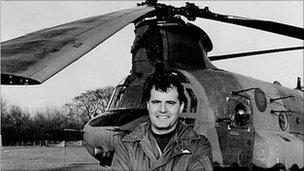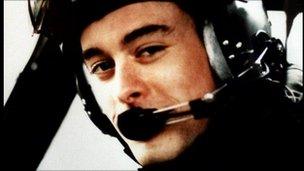Mull of Kintyre Chinook report ends 17-year dispute
- Published

Flight Lieutenant Rick Cook died in the Chinook helicopter crash in 1994
It was a flight which lasted just 17 minutes but the arguments over what happened that summer evening have lasted 17 years.
At 1742 BST, on 2 June 1994, an RAF Chinook helicopter took to the skies over RAF Aldergrove, near Belfast.
Minutes later, the helicopter crashed in a ball of flames on a cloud-covered hillside on the Mull of Kintyre, killing all 29 people on board.
Aboard flight ZD576 were 25 members of Northern Ireland's intelligence community on their way to a security conference at Fort George, near Inverness.
The four special forces crew included the pilots, Flt Lts Jonathan Tapper and Richard Cook.
The RAF convened a Board of Inquiry (BOI), which concluded the most probable cause of the crash was an inappropriate rate of climb although no evidence existed either pilot was negligent.
A sheriff at the fatal accident inquiry, held in Paisley, said he was not satisfied, on the balance of probabilities, by that explanation, adding: "It may then be asked what was the cause of the accident. For my part I can only say that I do not know."
Two RAF reviewing officers, Air Chief Marshal Sir William Wratten and Air Vice Marshall Sir John Day, disagreed.
They overturned the BOI's finding, saying the pilots had flown too fast, too low, in thick fog, and were grossly negligent.
Their decision sparked a long battle by the pilots' families and campaigners who sought to have the decision overturned.
Panel members
In the intervening years, several Commons' and Lords' committees, along with independent experts and former ministers, have challenged the findings of gross negligence but subsequent defence secretaries have refused to clear the pilots of blame.
That was despite evidence, which the Ministry of Defence dismissed as irrelevant, that has emerged since.
Last year, retired judge Lord Alexander Philip was asked by Defence Secretary Liam Fox to review the case.

Flight Lieutenant Jonathan Tapper was a pilot on the flight
For nine months, he has been sitting in private, along with three panel members - the former Labour Scottish Secretary Helen Liddell, ex-Tory Scottish Secretary Michael Forsyth and the Liberal Democrat Malcolm Bruce.
Among those brought before the review were the two Air Marshals responsible.
Lord Philip did consider, during the course of his inquiry, official doubts about the FADEC engine software on board the Chinook Mk 2, which engineers at the MoD's own testing site at Boscombe Down are now known to have described as "positively dangerous".
Also submitted to the review was a report revealed by the BBC in April, which showed that two years before the crash, an RAF Chinook Airworthiness Review Team (Chart) was established because of concerns about safety and maintenance standards.
The paper talks of a "wide range of Chinook airworthiness issues concerning both present HC Mk1 and the future Mk 2 Chinooks."
It was a Mk 2 helicopter that crashed into the Mull of Kintyre.
The Chart report said five previous Chinook crashes over six years had called into question the effectiveness of overall "management and maintenance".
Not relevant
But the report was never shown to the Board of Inquiry nor to the senior RAF official who signed off the helicopter's airworthiness.
The MoD said it was not relevant because it was written two years before and related only to the Mk 1 aircraft.
Campaigners believe the 1994 crash, which remains the RAF's worst peacetime loss of life, was not an isolated incident and blame systemic airworthiness issues within the military.
They say it has parallels with an RAF Nimrod accident in Afghanistan in 2006, which resulted in a damning report by Sir Charles Haddon Cave, who accused the MoD of sacrificing safety to cut costs.
But many senior RAF officials past and present still hold to the line that the Chinook pilots made an error, causing a crash which sent shockwaves through Northern Ireland's intelligence community just months before the IRA declared their 1994 ceasefire.
The families of the pilots - and the relatives of many of the others on board the plane - have spent the last two decades not knowing for sure what caused the crash.
'A dreadful wrong'
But on Wednesday, Lord Philip and his panel of three were unanimous that the findings of gross negligence should be overturned.
They concluded in a 99-page report that the air marshals were wrong and received incorrect legal advice at the time.
They recommended the verdict be overturned and an apology issued - and in the Commons, that's exactly what the defence secretary did.
It was the end of a long road for the families of the pilots - and the relatives of many of the others on board the plane.
Chris Cook, brother of Rick, said: "The reputations of these two young officers have been restored and we feel a dreadful wrong has been righted."
The decision provides closure for the families but, as the Philip report concedes, it leaves a mystery about what really happened that night in 1994.
- Published13 July 2011
- Published9 July 2011
- Published8 July 2011
- Published12 April 2011
- Published12 April 2011